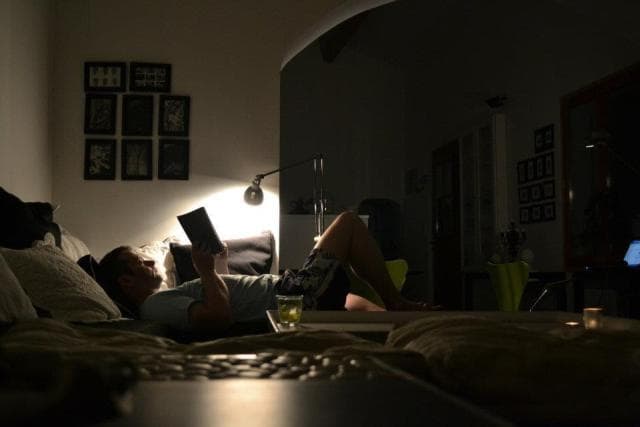Desperate to find natural ways to get more sleep?
If you’re looking for quick fixes like chamomile tea and lavender scented pillows, then sorry, this isn’t the blog for you.
But if you’re ready to heal your sleeping patterns naturally, you’re in it for the long haul, and you’re willing to make some serious long-term lifestyle changes, then read on…

I have a theory that there are two types of people in this world: those who can go to sleep on a clothes line, and those who are disturbed by the slightest thing: an uncomfy bed, a snoring partner, or restless thoughts from a stressful day.
I, sadly, belong to the latter camp.
Well – sadly for me – but not for you, dear reader. Because my tireless (or should that be tired) efforts over the years to discover how to get more shut-eye have led to me accumulating plenty of information on natural sleep, which I’m happy to pass on to you.
So here are a few tips I’ve picked up along the way:
5 natural ways to get more sleep
1. Get out more
It might come as a surprise to learn that the secret to getting more sleep lies first thing in the morning – not at the moment you get into bed. It’s really important to get yourself outside during daylight hours and allow some natural light in your eyes and on your skin.
The earlier in the morning you can do this, the better. Once your eyes encounter the morning sunshine, your body becomes naturally aware that it’s daytime.
This process regulates your circadian rhythms, which means you’ll be more likely to fall asleep faster, and stay asleep longer.
Avoiding artificial lights and screens during the evening will also help this process.
https://www.tuck.com/importance-morning-sunlight-better-sleep/
2. Kick the caffeine
I know the coffee addict in you is saying ‘it doesn’t really make any difference’… ‘I don’t really drink it in the evenings’.. etc etc – but honestly, if you’re having any trouble sleeping, do yourself a favour and get rid of the caffeine altogether.
https://www.sleepfoundation.org/articles/caffeine-and-sleep
You’ll be surprised at the difference between ‘avoiding coffee in the afternoon and evening’ and ‘giving it up altogether’.
If you’re still telling yourself that coffee doesn’t make any difference to your sleep, just ask yourself this question: why does the whole world love coffee as its favourite stimulant?
And remember, it’s not just coffee. Certain soft drinks such as Coca-Cola contain caffeine. And definitely steer clear of those ‘energy’ drinks!
https://www.sciencedaily.com/releases/2014/10/141002084308.htm
The very best way to gain more energy is to get enough sleep – all those so-called energy drinks do is leave you with an energy debt – one that you have to pay back with interest!
Another important point to bear in mind is the interaction between caffeine and certain medications, which can increase the potency of the stimulating effect. So it’s a good idea to check your medication inserts and see if this applies to you.
https://www.ncbi.nlm.nih.gov/m/pubmed/16206866/
Still not convinced that caffeine is affecting your sleep? A great book to read is Caffeine Blues – it’s a real eye-opener.
https://www.goodreads.com/book/show/891600.Caffeine_Blues
3. Get moving
Regular exercise is an excellent natural way to regulate your sleep patterns. And if you combine it with number 1 and exercise outside early in the day, then you’ll compound the benefits.
Don’t worry – you don’t have to slog it out doing some kind of exercise you don’t enjoy. Find something you like to do – get a friend involved and do something fun. The important thing is that you’re moving your body, and doing it consistently and regularly.
https://www.webmd.com/sleep-disorders/news/20100917/exercise-helps-you-sleep
4. Skip supper
Are you in the habit of eating food late in the evening? Going to bed with a full stomach is a recipe for a restless night.
Foods to watch out for in particular are: spicy foods, chocolate, and alcohol (so if you love a takeaway curry followed by wine and chocolate, I’m sorry to be the bearer of bad news).
https://www.verywellhealth.com/eating-before-bed-3014981
5. Switch off your stress at night
Are you going to bed with thoughts buzzing around your head? Are all the stressors of the day still bothering you, making you toss and turn?
It’s really important to find a way to disconnect from these stressful thoughts before you go to bed, otherwise they can plague you all night. And let’s face it, you can’t do anything practical about them until the next morning anyway, can you?
So make the decision to let them go before you hit the hay.
You could:
Talk them through with a friend or partner.
Journal them; get them out of your head and down onto paper. Make a list of some proactive ways you can deal with them the next morning.
Do some meditation before bed, or listen to some guided relaxations to gently take your mind away from those troubling thoughts.
Self-hypnosis is particularly helpful for reducing stress.
https://www.cherrytherapies.com/stress-management/
If you need some additional help and support, get in touch and book some hypnotherapy for insomnia with me.
https://www.cherrytherapies.com/contact/

Leave a Reply